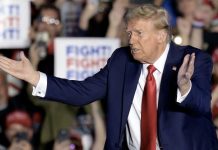
April 21 (UPI) — President Donald Trump took aim at more Obama-era federal regulations on Friday, signing three orders to re-examine government restrictions and safeguards that were put in place after the financial crisis.
At the White House with Treasury Secretary Steve Mnuchin, the president signed orders directing the department to review tax rules and the oversight of large U.S. financial institutions — banks deemed by some, “too big to fail” — contained in the Dodd–Frank Wall Street Reform and Consumer Protection Act of 2010.
The orders advance Trump’s promise to deregulate Wall Street and will potentially wipe away federal restrictions put in place by former President Barack Obama that aimed to curb abuses like corporate tax evasion and other fiscal activities that contributed to the financial crisis and Great Recession a decade ago.
Trump’s contention for scrapping the oversight is that it stifles corporate growth and, by extension, weakens the economy.
“Our goal is to make this a smarter, more effective process that reduces the kind of systemic risks that harmed so many Americans during the financial crisis of 2008,” Mnuchin said. “We intend to provide a clear analysis to the extent of which orderly liquidation authority encourages inappropriate risk-taking, and the extent of taxpayer liability.”
Trump signed a presidential memorandum to review Dodd-Frank, as a follow up to an executive order he issued in February to overhaul the 2010 law.
Trump also signed an executive order Friday for Mnuchin to review new tax regulations imposed last year to see if they are cost-effective or fall outside of the department’s authority. The rules, imposed under Obama, make it more difficult for American corporations to achieve “tax inversions” — a practice that allows them to avoid taxes by legally becoming a “foreign” U.S.-based entity.
Another memorandum signed Friday orders the Treasury to review the Financial Stability Oversight Council’s procedure in designating banks “too big to fail.”
“The Treasury Department is the guardian of America’s wealth and a worldwide symbol of America’s prestige,” Trump said. “Secretary Mnuchin, who I’ve known for so long — and he’s so good and so smart and so financially adept — is working very hard every day to do just that, to protect the working citizens of America and to safeguard our finances from anyone, anybody, any nation who would try to take advantage of the United States.”
“We have taken unprecedented action to bring back our jobs and return power to our citizens — it’s been taken away,” he continued. “We have lifted one terrible regulation after another … and we have many more to go.”
In his remarks, Trump again blasted other countries for failing to “pay their fair share” in NATO defense and said his actions would hold their feet to the fire.
“We are going to end that and end it quickly. We want fairness.”
For weeks, Trump has gone after numerous regulations imposed by Obama’s administration on a number of fronts, from energy to education to climate change.
“We are now in the process of rebuilding America and there’s a new optimism sweeping across our country like people have not seen in many, many decades,” Trump said. “We are here today to continue this great economic revival.”
Critics, though, aren’t buying it. They contend Trump’s maneuvers are simply efforts to kowtow to Wall Street, fatten the bottom lines of the wealthy and make it easier for them to skirt federal laws — measures that are decidedly not in the interests of low- and middle-class Americans.
“These are things that hit people directly in their pocketbook,” Michael Barr, a former Treasury Department official and one of the architects of Dodd-Frank, said.
Some analysts believe Trump is scrambling to put together some accomplishments within his first 100 days in office, a period that ends next week — particularly after embarrassing failures to repeal and replace the Affordable Care Act and impose a U.S. travel ban for refugees and immigrants.
Trump said during the news conference Friday that he expects the White House will release his plan for tax reform on Wednesday.
“So, go do it,” Trump told Mnuchin.
“I will, Mr. President,” the treasury secretary replied.
Trump promised during his campaign to dismantle Dodd-Frank, but experts say accomplishing that feat is extremely unlikely. Instead, they say, the president is attempting to pick off parts of the law, piecemeal.
Experts say rolling back federal regulations aimed at consumer protection might be effective in growing corporate profits, but eliminating too many is virtually a surefire recipe for another economic disaster.
“One way to substantially reduce consumer protection, even if you don’t have the votes to abolish the agency, is to starve it of its funds,” Barney Frank, a former Massachusetts congressman for whom the Obama law was partly named, told USA Today. “If you don’t keep the rules we have in place to restrain irresponsible risk-taking, you’ll have, at some point, another crash.”
“If you don’t regulate firms, you’re not going to have capital, and they’re going to do risky things,” he added, saying that if any of the large banks fail during a future crisis, “taxpayers are ultimately going to be on the hook.”





